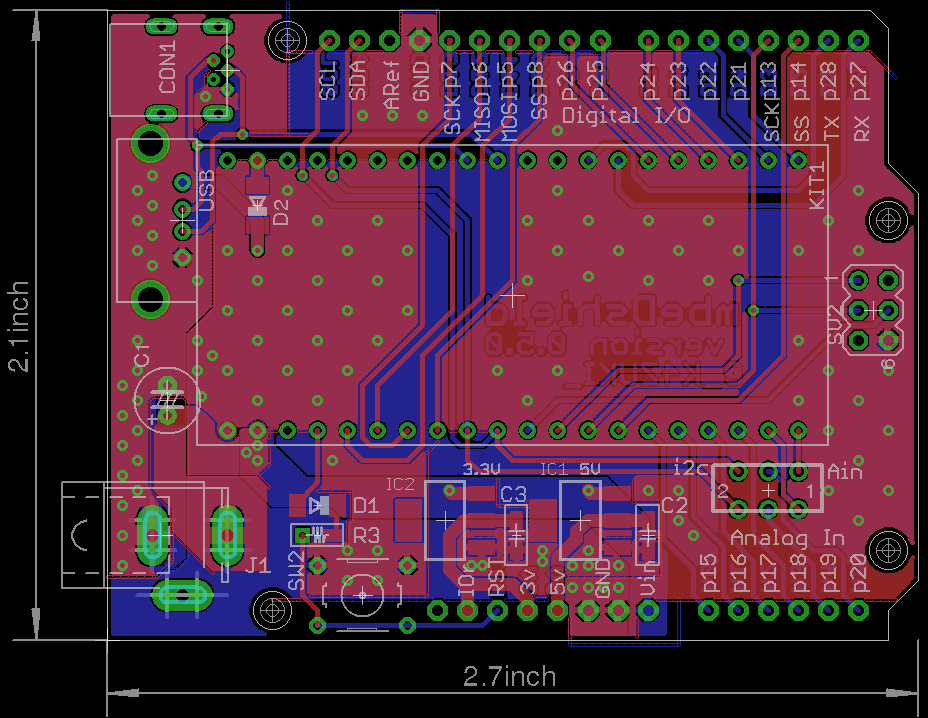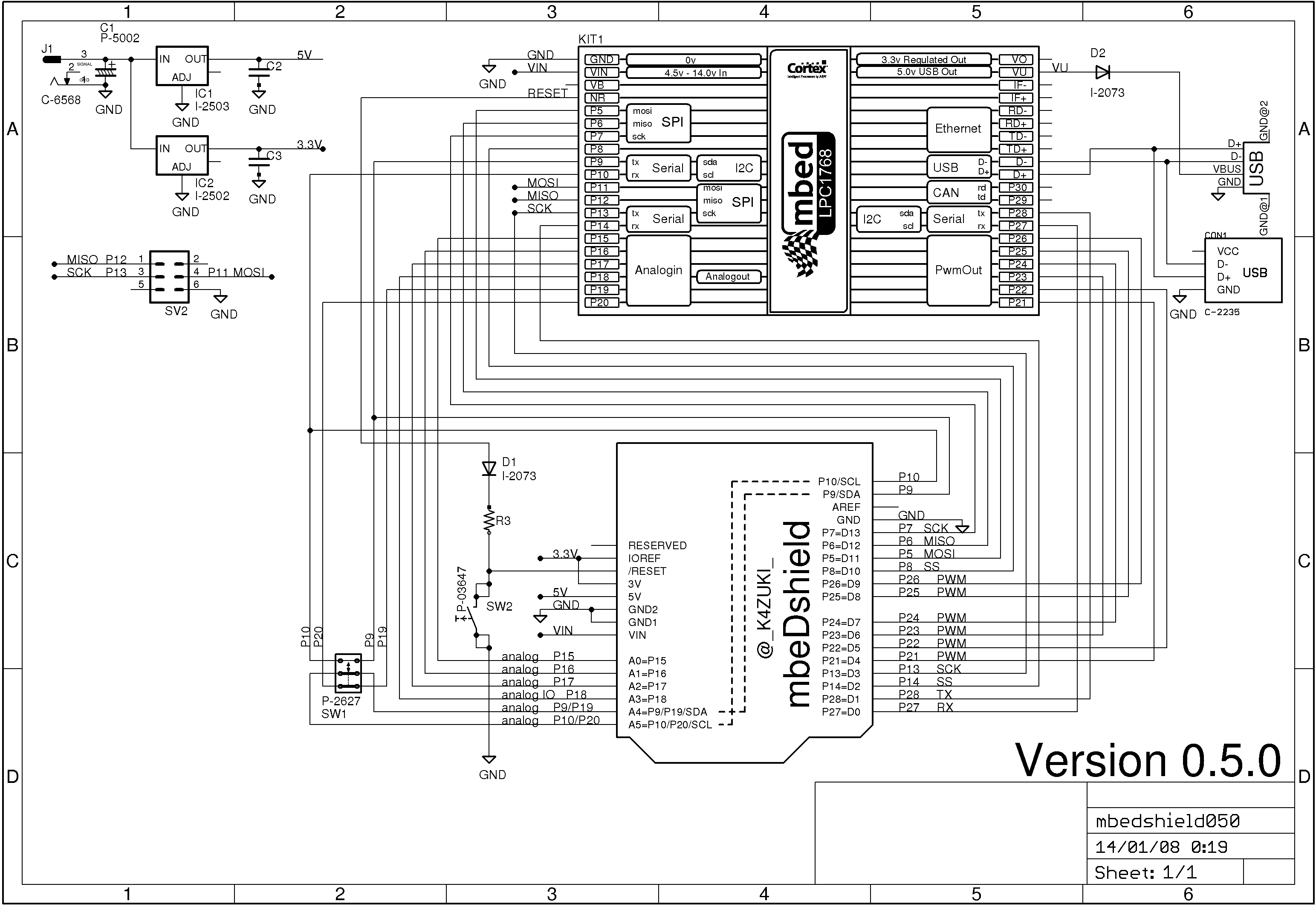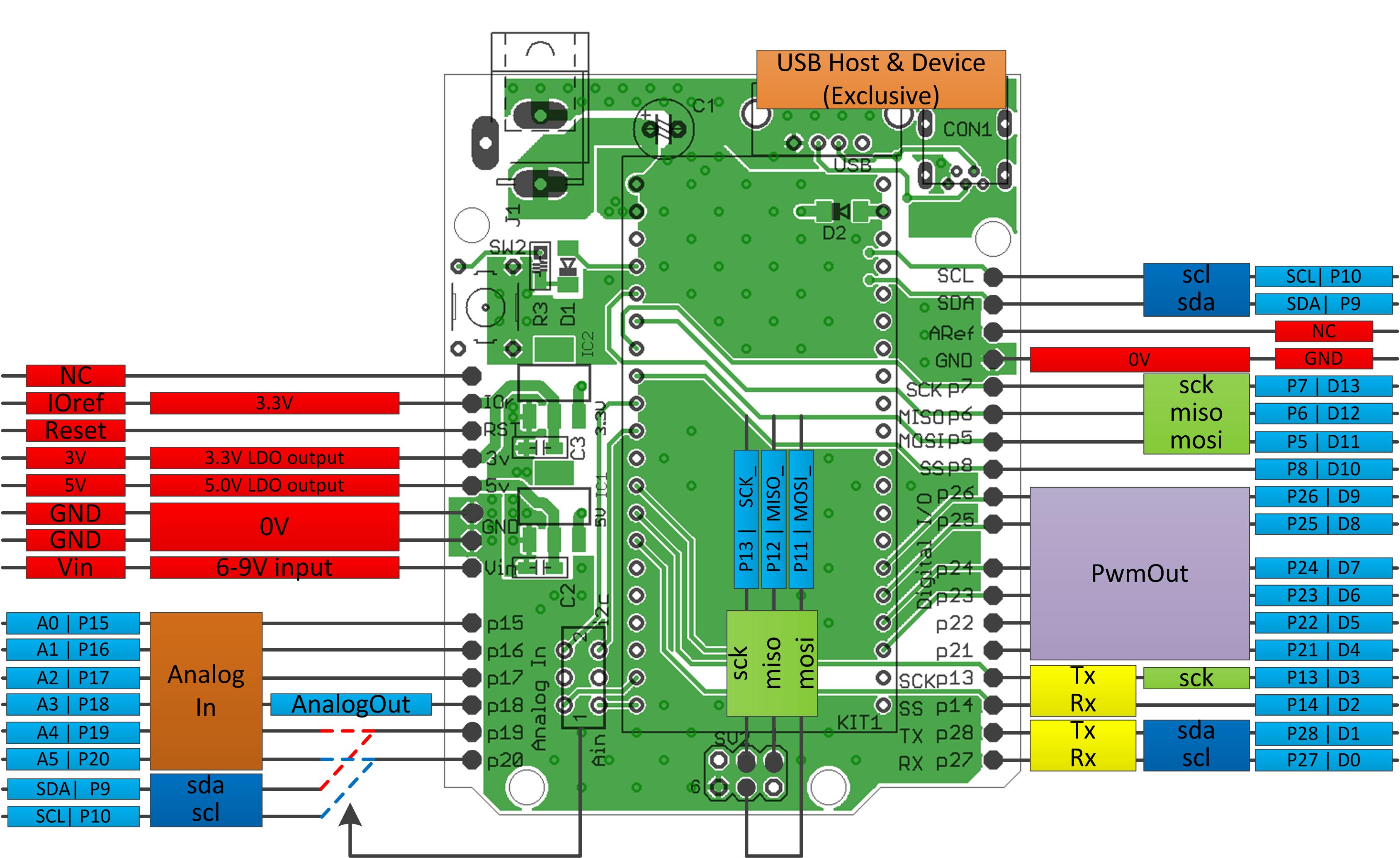The official mbed C/C SDK provides the software platform and libraries to build your applications.
Fork of mbed by
(01.May.2014) started sales! http://www.switch-science.com/catalog/1717/
(13.March.2014) updated to 0.5.0
This is a pin conversion PCB from mbed 1768/11U24 to arduino UNO.
- So if you have both mbed and arduino shields, I guess you would be happy with such a conversion board :)
Photos
- Board photo vvv

- Schematic photo vvv

- Functionality photo vvv

Latest eagle files
PCB >> /media/uploads/k4zuki/mbedshield050.brd
SCH >> /media/uploads/k4zuki/mbedshield050.sch
BIG changes from previous version
- Ethernet RJ45 connector is removed.
- http://mbed.org/components/Seeed-Ethernet-Shield-V20/ is the biggest hint to use Ethernet!
MostALL of components can be bought at Akizuki http://akizukidenshi.com/- But sorry, they do not send parts to abroad
- Pinout is changed!
| arduino | 0.4.0 | 0.5.0 |
|---|---|---|
| D4 | p12 | p21 |
| D5 | p11 | p22 |
| MOSI_ | none | p11 |
| MISO_ | none | p12 |
| SCK_ | none | p13 |
This design has bug(s)
- I2C functional pin differs between 1768 and 11U24.
Fixed bugs here
- MiniUSB cable cannot be connected on mbed if you solder high-height electrolytic capacitor on C3.
- http://akizukidenshi.com/catalog/g/gP-05002/ is the solution to make this 100% AKIZUKI parts!
- the 6-pin ISP port is not inprimented in version 0.4.0
it will be fixed in later version 0.4.1/0.4.2/0.5.0This has beenfixed
I am doing some porting to use existing arduino shields but it may faster if you do it by yourself...
you can use arduino PinName "A0-A5,D0-D13" plus backside SPI port for easier porting.
To do this you have to edit PinName enum in
- "mbed/TARGET_LPC1768/PinNames.h" or
- "mbed/TARGET_LPC11U24/PinNames.h" as per your target mbed.
here is the actual list: This list includes define switch to switch pin assignment
part_of_PinNames.h
USBTX = P0_2,
USBRX = P0_3,
//from here mbeDshield mod
D0=p27,
D1=p28,
D2=p14,
D3=p13,
#ifdef MBEDSHIELD_050
MOSI_=p11,
MISO_=p12,
SCK_=p13,
D4=p21,
D5=p22,
#else
D4=p12,
D5=p11,
#endif
D6=p23,
D7=p24,
D8=p25,
D9=p26,
D10=p8,
D11=p5,
D12=p6,
D13=p7,
A0=p15,
A1=p16,
A2=p17,
A3=p18,
A4=p19,
A5=p20,
SDA=p9,
SCL=p10,
//mbeDshield mod ends here
// Not connected
NC = (int)0xFFFFFFFF
Timer.h
- Committer:
- simon.ford@mbed.co.uk
- Date:
- 2009-01-22
- Revision:
- 5:62573be585e9
- Parent:
- 4:5d1359a283bc
- Child:
- 11:1c1ebd0324fa
File content as of revision 5:62573be585e9:
/* mbed Microcontroller Library - Timer
* Copyright (c) 2007-2008, sford
*/
#ifndef MBED_TIMER_H
#define MBED_TIMER_H
#include "Base.h"
namespace mbed {
/* Class: Timer
* A general purpose timer
*/
class Timer : public Base {
public:
Timer(const char *name = NULL);
/* Group: Access Methods */
/* Function: start
* Start the timer
*/
void start();
/* Function: stop
* Stop the timer
*/
void stop();
/* Function: reset
* Reset the timer to 0.
*
* If it was already counting, it will continue
*/
void reset();
/* Function: read
* Get the time passed in seconds
*/
float read();
/* Function: read_ms
* Get the time passed in mili-seconds
*/
int read_ms();
/* Function: read_us
* Get the time passed in micro-seconds
*/
int read_us();
operator float();
int slicetime();
int _running; // whether the timer is running
unsigned int _start; // the start time of the latest slice
int _time; // any accumulated time from previous slices
virtual const struct rpc_method *get_rpc_methods();
static struct rpc_class *get_rpc_class();
};
}
#endif
